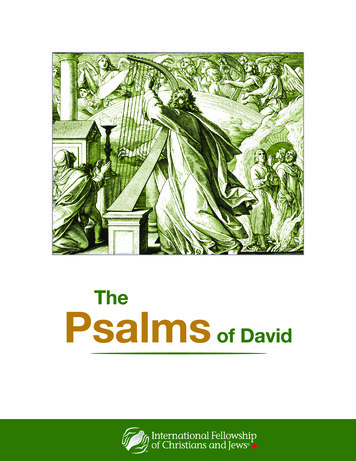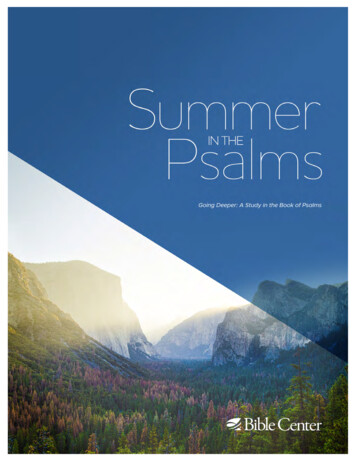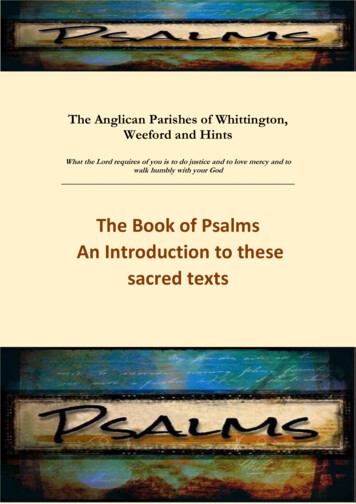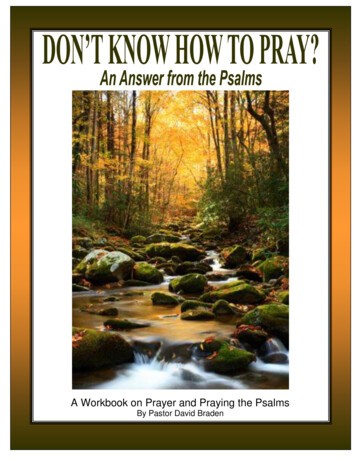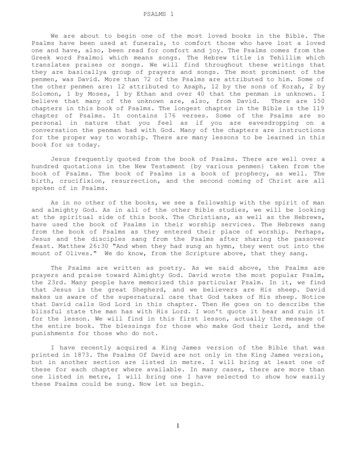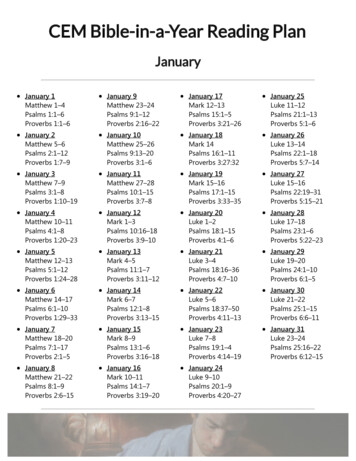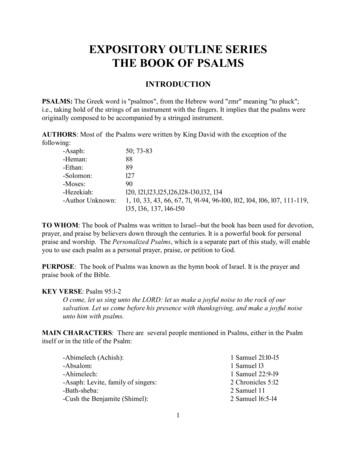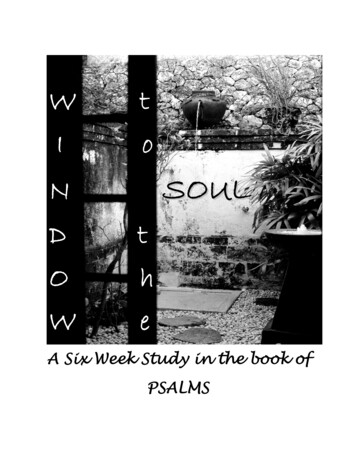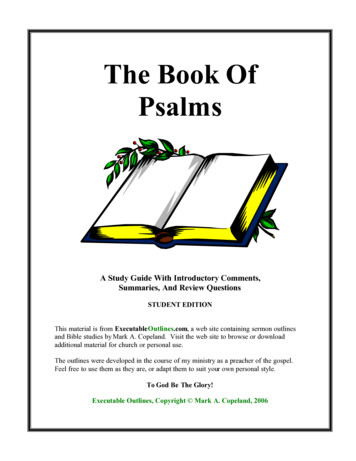
Transcription
The Book OfPsalmsA Study Guide With Introductory Comments,Summaries, And Review QuestionsSTUDENT EDITIONThis material is from ExecutableOutlines.com, a web site containing sermon outlinesand Bible studies by Mark A. Copeland. Visit the web site to browse or downloadadditional material for church or personal use.The outlines were developed in the course of my ministry as a preacher of the gospel.Feel free to use them as they are, or adapt them to suit your own personal style.To God Be The Glory!Executable Outlines, Copyright Mark A. Copeland, 2006
Mark A. CopelandThe Book Of PsalmsTable Of ContentsIntroduction To The PsalmsPsalm 1 - The Truly Happy ManPsalm 2 - The Ultimate Victory Of The MessiahPsalm 3 - A Morning Prayer For God’s ProtectionPsalm 8 - The Song Of The AstronomerPsalm 15 - The Marks Of A True WorshiperPsalm 16 - David’s Golden SecretPsalm 19 - God’s Two BooksPsalm 22 - The Victorious SuffererPsalm 23 - The Shepherd PsalmPsalm 27 - Light And Salvation In Dark TimesPsalm 32 - The Blessedness Of Confessing SinPsalm 37 - The Meek Shall Inherit The EarthPsalm 38 - The Penitent Plea Of A Sick ManPsalm 51 - The Penitent’s PrayerPsalms For Living And Worship3121518212426293337404346505357This study guide was developed in preparation for teaching adult Bible classes.Note: The Lord willing, I intend to add more outlines on various psalms sometime in the future.w The objectives for each section are usually things I plan to emphasize during theclass.w I have found that summarizing and outlining helps me to better understand the Wordof God. It is a practice I highly recommend to others.The Book Of Psalms2
Mark A. CopelandThe Book Of PsalmsIntroduction To The PsalmsThe value of the Old Testament to the Christian is expressed several times in the New Testament:For whatever things were written before were written for our learning, that we throughthe patience and comfort of the Scriptures might have hope. (Ro 15:4)Now all these things happened to them as examples, and they were written for ouradmonition, upon whom the ends of the ages have come. (1 Co 10:11)Paul reminded Timothy of the importance of the Old Testament scriptures he had learned as a child:But you must continue in the things which you have learned and been assured of,knowing from whom you have learned them, and that from childhood you have knownthe Holy Scriptures, which are able to make you wise for salvation through faith whichis in Christ Jesus.All Scripture is given by inspiration of God, and is profitable for doctrine, for reproof,for correction, for instruction in righteousness, that the man of God may be complete,thoroughly equipped for every good work. (2 Ti 3:14-17)Of the books of the Old Testament, this is especially true of the book of Psalms! The value of thePsalms for the Christian is so great, we should do what we can to become more familiar with them.Allow me to elaborate.WHY STUDY THE PSALMS?As Christians, we are commanded to utilize the Psalms:Speaking to one another in psalms and hymns and spiritual songs, singing and makingmelody in your heart to the Lord, (Ep 5:19)Let the word of Christ dwell in you richly in all wisdom, teaching and admonishing oneanother in psalms and hymns and spiritual songs, singing with grace in your hearts tothe Lord. (Co 3:16)Is anyone among you suffering? Let him pray. Is anyone cheerful? Let him singpsalms. (Ja 5:13)Thus the Psalms are useful for singing praises to God. They are also useful for teaching and confirmingthat Jesus is the Christ or Messiah. Note the use Jesus made of them (Lk 24:44-47), and also Peter's useof them in his first gospel sermon (Ac 2:25-28,34-35).It has been said that in the Psalms one finds “expressed the eager yearning and longing for God'spresence.” It certainly contains “prayers and songs of joyous trust and praise.” Indeed, every emotionThe Book Of Psalms3
Mark A. Copelandknown to man is expressed in beautiful and inspired terms (e.g., joy, anger, praise, repentance, trust,even doubt). Filled with some emotion for which you cannot find the words to express it? It is likelyyou will find it expressed in the book of Psalms!I would therefore suggest that the Psalms are capable of serving as:w The Christian's “hymnal” to assist us in our praise to Godw The Christian's “prayer book” in which we learn how to approach God in prayerw The Christian's “book of evidences” to strengthen our faith in Jesus Christw The Christian's “training guide” for living holy and righteous lives before GodTHE AIM OF THIS STUDYIt is my prayer that as we study this book we will accomp lish the following goals:w Become more familiar with Old Testament poetry - This is essential to gettingmore out the Psalms, and important if we are to avoid misinterpreting themw Develop an appreciation and working knowledge of the Psalms - So one mayutilize them for his or her own comfort and encouragement, and in counseling andcomforting othersw Glean a clearer picture of God's character - To better understand His love, mercyand deliverance towards the righteous, but also His wrath and judgment against thewickedw Learn more of the Christ in prophecy - To note descriptions of His suffering andglorious reign found in the Psalms, some of which are not found elsewhere inScripturew Consider examples of fulfilled prophecies - To see in fulfilled prophecy irrefutablearguments for the inspiration of the Scriptures, and for the claim that Jesus ofNazareth is the MessiahThese are just a few of the reasons why the Book of Psalms should be read and studied by everyChristian, and hopefully this study will help to meet these objectives.CHARACTERISTICS OF HEBREW POETRYBefore we get into the background of the Psalms themselves, it may prove beneficial to consider somethings about Hebrew poetry. Not only will this help to better understand the nature of the Psalms, but itcan also assist in proper interpretation of this portion of Scripture.One of the things that makes Hebrew poetry different is.The Book Of Psalms4
Mark A. CopelandThe Use Of "Thought Rhyme"Also known as “parallelism”, thought rhyme involves arranging thoughts in relation to each other. Thisis done without a concern as to whether certain words rhyme with each other (as found in most modernpoetry). In the Psalms, we find several different kinds of thought rhyme:w Synonymous parallelism - The thought of first line is repeated in the second line,expressed in different words for the sake of emphasis. A good example is found inPsa 24:2.For He has founded it upon the seas,And established it upon the waters. (same idea, reworded)w Antithetical parallelism - The truth presented in one line is strengthened by acontrasting statement in the next line. Consider this example from Psa 1:6.For the LORD knows the way of the righteous,But the way of the ungodly shall perish. (note the contrast)w Synthetic pa rallelism - The first and second lines bear some definite relation to eachother (such as cause and effect, or proposition and conclusion). A good example isPsa 119:11.Your word I have hidden in my heart, (cause)That I might not sin against You! (effect)w Progressive parallelism - There are several varieties of this form, the most commonbeing:Stair-like - Composed of several lines, each providing a complete element of theaggregate or composite thought. Notice Psa 1:1.Blessed is the man.Who walks not in the counsel of the ungodly,Nor stands in the path of sinners,Nor sits in the seat of the scornful; (note the progression)Climatic - Here the principal idea in the first line is repeated and expanded tocomplete the thought. An example is found in Psa 29:1.Give unto the LORD, O you mighty ones (give what?)Give unto the LORD glory and strength. (the answer)w Introverted parallelism - The first line is closely related in thought to the fourth, andthe second to the third. For example, consider Psa 91:14.Because he has set his love upon Me, (note line 4)therefore I will deliver him; (note line 3)I will set him on high, (note line 2)The Book Of Psalms5
Mark A. Copelandbecause he has known My name. (note line 1)It is often fascinating to note how creative the Hebrew poets were as they composed their poetry using“thought rhyme” rather than “word rhyme.” In some cases it even helps in interpreting difficultexpressions or phrases. Another characteristic of Hebrew poetry is.The Lack Of Poetic RhythmMuch modern poetry has standard measures of identifiable rhythm, as in the poem “Mary Had A LittleLamb.” With the Hebrews, however, the art of poetic rhythm was of secondary consideration. Somesuggest that it is not likely that the Hebrew poets had standard measures, worked out and carefullydefined. Again, their focus was on “thought rhyme,” not “word rhyme.”Finally, an important characteristic of Hebrew poetry is.The Use Of Figurative Expre ssionThe Psalms are filled with figurative expressions, and as such it is important to keep certain principles ofinterpretation in mind.w The figure must be accepted and dealt with as a figure of speech, not as a literalstatementFor example, in Psa 18:31, the Lord is called “a rock.” He is like a rock, but not oneliterally. In Psa 51:4, David says “Against You, You only, have I sinned.” Yet he isconfessing his sin of adultery with Bathsheba, in which he sinned not only against the Lord,but against his wife, against Uriah, and many others. David was speaking figuratively for thesake of expressing his deep grief in sinning against God, and we must allow for figurativeexpressions including hyperbole in poetic writings. One needs to be careful and not developdoctrinal beliefs upon what may be figurative expressions not intended to be taken literally.w The figure must be interpreted in light of its meaning in the setting in which it wasusedFor example, in Psa 23:4, we find the well-known phrase: “the valley of the shadow ofdeath.” It is not uncommon to hear the phrase applied at funerals to the act of dying. Inthe setting of the psalm, however, it refers to a treacherous place (such as a steep valley,where deep shadows can easily cause a misstep resulting in death), where the guiding handof a shepherd would be very helpful to sheep to avoid death. It is therefore applicable toany time one is in perilous straits and in need of God's guiding hand.Appreciating these characteristics of Hebrew poetry can help the Psalms become more meaningful, andunderstanding these characteristics can also help avoid misinterpreting the Psalms to teach doctrines thepsalmist had no intention of teaching!BACKGROUND MATERIAL ON THE PSALMSThe Book Of Psalms6
Mark A. CopelandHaving examined some of unique characteristics of Hebrew poetry in general, let's now focus on thebook of Psalms itself.The Origin Of The Word “Psalm”The Greek word is “psalmos,” from the Hebrew word “zmr” meaning “to pluck;” i.e., taking hold of thestrings of an instrument with the fingers. It implies that the psalms were originally composed to beaccompanied by a stringed instrument. “Psalms are songs for the lyre, and therefore lyric poems in thestrictest sense.” (Delitzsch, Psalms, Vol. I, p. 7) David and others therefore originally wrote the Psalmsto be sung to the accompaniment of the harp.In New Testament worship, we are told to sing the psalms to the accompaniment of the heart:“.in psalms, hymns, and spiritual songs, singing and making melody in your heart tothe Lord” (Ep 5:19)The phrase, “making melody,” comes from the Greek word “psallontes” (literally, plucking the stringsof). Therefore, we are to “pluck the strings of our heart” as we sing the psalms (i.e., to sing withemotion).The History Of The PsalmsThe oldest of the Psalms originate from the time of Moses (1400 B.C.). We have three psalms pennedby Moses:w Exo 15:1-15 - a song of triumph following the crossing of the Red Seaw Deu 32, 33 - a song of exhortation to keep the Law after entering Canaanw Psa 90 - a song of meditation, reflection, and prayerAfter Moses, the writing of Psalms had its “peaks” and “valleys”:In David (1000 B.C.), the sacred lyric attained to its full maturity.With Solomon, the creation of psalms began to decline; this was “the age of the proverb.”Only twice after this did the creation of psalms rise to any height, and then only for a short period:under Jehoshaphat (875 B.C.) and again under Hezekiah (725 B.C.).The Authors Of The Psalmsw David - Commonly thought to be the author of the book of Psalms, but he actuallywrote only about seventy-three (73), less than half.w Asaph - The music director during the reigns of David and Solomon (1 Chr 16:1-7).He wrote twelve (12) psalms.The Book Of Psalms7
Mark A. Copelandw The Sons of Korah - These were Levites who served in the Temple (1 Chr 26:1-19).They wrote twelve (12) psalms.w Solomon - At least two (2) psalms are attributed to him (Psa 72, 127). That he wrotemany more is stated in 1 Kin 4:29-32.w Moses - As indicated above, he wrote the earliest psalms; one is included in Psalms(Psa 90).w Heman - Contemporary with David and Asaph, and is known as “the singer” (1 Chr6:33). He wrote one psalm (Psa 88) that has been preserved.w Ethan - A companion with Asaph and Heman in the Temple worship (1 Chr 15:19).He wrote one psalm (Psa 89).w Anonymous - The authorship of forty-eight (48) of the psalms is unknown.The Arrangement Of The PsalmsThe Psalms were originally collected into five “books,” apparently according to the material foundwithin them:Book I (Ps 1-41)Book II (Ps 42-72)Book III (Ps 73-89)Book IV (Ps 90-106)Book V (Ps 107-150)The Psalms can also be arranged into chief “groups”:w Alphabetic or Acrostic - These psalms have lines which in Hebrew start with wordswhose first letters follow a certain pattern. For example, in Psa 119 the first eightlines start with words beginning with the Hebrew letter ALEPH, the second eightlines with words beginning with BETH, etc. This may have been done to aid in thememorization of the psalm.w Ethical - These psalms teach moral principles (e.g., Psa 15).w Hallelujah - These are psalms of praise, beginning and/or ending with “hallelujah” or“praise Jehovah” (e.g., Psa 103).w Historical - Psalms which review the history of God's dealings with His people (e.g.,Psa 106).w Imprecatory - These psalms invoke God to bring punishment or judgment uponone's enemies (e.g., Psa 69).w Messianic - Psalms pertaining to the coming Messiah (e.g., Psa 2, 110).The Book Of Psalms8
Mark A. Copelandw Penitential - These are psalms expressing sorrow for sins that have been committed(e.g., Psa 51).w Songs Of Ascent (or Songs Of Degrees) - These psalms were possibly sung bypilgrims on the way to Jerusalem to observe the feasts. They are grouped together asPsa 120-134.w Suffering - These psalms are cries of those suffering affliction (e.g., Psa 102).w Thanksgiving - Psalms of grateful praise to Jehovah for blessings received (e.g., Psa100).The various “styles” of the psalms can be described as.w Didactic - Psalms of teaching and instruction (e.g., Psa 1).w Liturgical - Responsive readings, for use in special services (e.g., Psa 136).w Meditation - The ancient Hebrews were given to meditation, which spirit findsexpression in many of the psalms (e.g., Psa 119).w Praise and Devotion - Psalms of joyful praise (e.g., Psa 148).w Prayer and Petition - Psalms which were sung in an attitude of prayer (e.g., Psa 51).Hopefully, this brief background of the Book Of Psalms will help one gain a better feel and appreciationfor this type of Scripture.REVIEW QUESTIONS FOR THE INTRODUCTION1) According to Ro 15:4, why was the Old Testament written?2) According to 1 Co 10:11, why were the events in Old Testament times recorded?3) As Paul reminded Timothy, of what value were the Scriptures (Old Testament) he hadlearned as a child? (cf. 2 Ti 3:14-15)4) What is Scripture profitable for, including the Old Testament? (cf. 2 Ti 3:16-17)The Book Of Psalms9
Mark A. Copeland5) What three Scriptures teach Christians to utilize the Psalms?6) What are the Psalms capable of serving for the Christian?7) What will be the aim of this study in the Psalms?8) What three characteristics of Hebrew poetry were pointed out in this introduction?9) List the five different types of “parallelis m” described in this study.10) What was the original meaning of the word "psalm"?11) In New Testament worship, what is the instrument upon which melody is to be played? (cf.Ep 5:19)12) Who wrote some of the earliest Psalms?13) When did the writing of Psalms reach its peak?14) List some of the authors who penned the Psalms in our Bible.The Book Of Psalms10
Mark A. Copeland15) List different “groups” into which the Psalms can be placed.16) List the different “styles” of the Psalms.The Book Of Psalms11
Mark A. CopelandThe Book Of PsalmsPsalm 1 - The Truly Happy ManOBJECTIVES IN STUDYING THIS PSALM1) To examine the blessedness of the righteous, in stark contrast to the desperation of the wicked2) To note both the negative and positive elements that lead to the truly happy life3) To note four examples of parallelism that are indicative of Hebrew poetrySUMMARYThe first psalm, didactic in style, serves as an appropriate preface to the entire collection of psalms. Itstheme can be described as “The Truly Happy Man” as it depicts the blessedness, or happiness, of therighteous man in contrast to the wicked.The blessedness of the righteous man is described first from a negative perspective, in what he will notdo. With the aid of stair- like progressive parallelism, the truly happy man is depicted as not allowinghimself to be in the presence or under the influence of the wicked. Instead, he finds delight inmeditating day and night on the law of the Lord. His blessedness is pictured as a healthy, fruitful tree,nourished by rivers of water. Whatever he does, he prospers (1-3).The wicked, in stark contrast, are not so blessed. They are like chaff driven by the wind. In thejudgment, they shall not be able to stand. Nor shall they be blessed to be in the congregation of therighteous (4-5).The psalm ends with a contrast between the two “ways.” The way of the righteous is known (blessed,providentially cared for) by the Lord. The way of the ungodly shall perish, like a trail leading into aswamp that eventually disappears (6).OUTLINEI. THE BLESSEDNESS OF THE RIGHTEOUS MAN (1:1-3)A. HIS CHARACTER (1-2)1. Described from a negative point of viewa. Walks not in the counsel of the ungodlyb. Nor stands in the path of sinners - Pro 4:14-15c. Nor sits in the seat of the scornful - Psa 26:4-52. Described from a positive perspectivea. His delight is in the law of the Lord - Psa 40:8; 119:47,48; Jer 15:16b. In God's law he meditates day and night - Psa 119:97-99B. HIS PROSPERITY (3)The Book Of Psalms12
Mark A. Copeland1. Like a tree planted by rivers of water - Psa 92:12-15; Jer 17:7-8a. That brings forth fruit in its seasonb. Whose leaf shall not wither2. Whatever he does shall prosper - Josh 1:7-8II. THE DESPERATION OF THE WICKED (1:4-5)A. NOTHING LIKE THE RIGHTEOUS (4)1. The ungodly are not so (lit., “Not so, are the ungodly!”)2. They are like the chaff which the wind drives away - Job 21:17-18B. THEIR SORRY END (5)1. The ungodly shall not stand in the judgment2. The sinners shall not stand in the congregation of the righteousIII. A FINAL CONTRAST BETWEEN THEIR TWO WAYS (1:6)A. THE LORD KNOWS THE WAY OF THE RIGHTEOUS (6a)B. THE WAY OF THE UNGODLY SHALL PERISH (6b)REVIEW QUESTIONS FOR THE PSALM1) What are the main points of this psalm?2) What is the theme of this psalm?3) What is the style of this psalm?4) What does the blessed man not do, as described in this psalm? (1)5) What example of parallelism, or thought rhyme, do we find in verse one?6) What is the source of delight for the one who is blessed? (2)7) What does the blessed man do to experience such delight? (2)The Book Of Psalms13
Mark A. Copeland8) What example of parallelism, or thought rhyme, do we find in verse two?9) What will such a blessed person be like? (3)10) What example of parallelism, or tho ught rhyme, do we find in verse three?11) What else is said about this blessed man? (3)12) What are the ungodly like? (4)13) What will not happen to the ungodly and sinners? (5)14) How are the righteous and the wicked contrasted at the end of this psalm? (6)15) What example of parallelism, or thought rhyme, do we find in verse six?The Book Of Psalms14
Mark A. CopelandThe Book Of PsalmsPsalm 2 - The Ultimate Victory Of The MessiahOBJECTIVES IN STUDYING THIS PSALM1) To note the Messianic nature of this psalm2) To consider its fulfillment as expounded by Jesus and His apostles in the New Testament3) To take comfort in knowing that the Messiah has ultimate control over world affairsSUMMARYThis psalm is Messianic in nature, with its theme being “The Ultimate Victory Of The Lord'sAnointed.” It is quoted by the apostles and early church in their prayer for help against persecution (cf.Ac 4:24-30), in which they applied it to the efforts of Pontius Pilate along with Gentiles and those ofIsrael who crucified Christ. From this reference in Acts we also learn that David was the author.The psalm is divided into four sections (or strophes), in each of which there is a different voice thatspeaks. The first strophe begins with the psalmist observing the efforts of the nations and their leadersto resist the Lord and His Anointed. They declare their desire to break away from the cords that bindthem (1-3). The second strophe depicts the Lord in heaven as laughing in derision over their futileefforts. In righteous anger He declares that despite their resistance He has installed His King (i.e., HisAnointed One) on Zion, His holy hill (4-6).In the third stanza or strophe, the Anointed One speaks, in which He declares the decree of the Lord. Heis God’s begotten Son, who upon request is given the nations and ends of the earth as an inheritancewhich He will rule with a rod of iron (7-9). From Jesus and His apostles, we learn that this rule beganwhen He ascended to heaven and sat down at the right hand of God (cf. Mt 28:18; Ep 1:20-22; 1 Pe3:22; Re 1:5; 2:26-27).The psalm ends with the fourth strophe containing the psalmist’s counsel of what the leaders of thenations should do: Worship the Lord with reverence, and do homage to the Son lest they incur Hisrighteous anger. For all who put their trust in the Anointed One, they shall be blessed (10-12).OUTLINEI. THE NATIONS’ RESISTANCE (2:1-3)A. THE PSALMIST’S INQUIRY (1)1. Why do the nations rage?2. Why do the people plot a vain thing?B. THE PSALMIST’S OBSERVATION (2-3)1. Against the Lord and His Anointed.The Book Of Psalms15
Mark A. Copelanda. The kings of the earth set themselvesb. The rulers take counsel together2. Against the Lord and His Anointed they say.a. “Let us break Their bonds in pieces”b. “(Let us) cast away Their cords from us”II. THE LORD’S REJOINDER (2:4-6)A. THE LORD’S REACTION (4)1. He who sits in the heaven shall laugh2. The Lord shall hold them in deep derisionB. THE LORD’S REPLY (5-6)1. He shall speak to them in His wrath2. He will distress them in His deep displeasure3. He will proclaim: “Yet I have set My King on My holy hill Of Zion”III. THE MESSIAH’S RESPONSE (2:7-9)A. THE DECREE GIVEN HIM (7)1. “You are My Son”2. “Today I have begotten You”B. THE AUTHORITY GIVEN HIM (8-9)1. The extent of His rulea. “The nations for Your inheritance”b. “The ends of the earth for Your possession”2. The power of His rulea. “You shall break them with a rod of iron”b. “You shall dash them to pieces like a potter's vessel”IV. THE PSALMIST’S REPROACH (2:10-12)A. TO KINGS AND JUDGES (10-11)1. Be wise, be instructed2. Serve the LORD with fear3. Rejoice with tremblingB. TO THEM AND ALL (12)1. Kiss the Son lest He be angrya. And you perish [in] the wayb. When His wrath is kindled but a little.2. Blessed are all those who put their trust in Him.REVIEW QUESTIONS FOR THE PSALM1) What are the main points of this psalm?The Book Of Psalms16
Mark A. Copeland2) Against whom are the kings and rulers taking counsel? (2)3) What are the kings and rulers saying? (3)4) What reaction does this prompt from the Lord in heaven? (4-5)5) What will the Lord say to these kings and rulers? (6)6) How will the Anointed One (i.e., the Messiah) respond? (7)7) Who is the Anointed One? (7)8) As applied by Paul, what “day” was the Messiah “begotten” by God? (7; cf. Ac 13:33)9) What did the Lord promise His Anointed One? (8)10) According to Jesus and His apostles, has He been given this authority? If so, when? (cf.Mt 28:18; Ep 1:20-22; 1 Pe 3:22; Re 1:5; 2:26-27)11) What will He do to the nations with this authority? (9; cf. Re 2:26-27)12) What wisdom and instruction does the psalmist give to kings and judges? (10-12)13) What of those who put their trust in the Son? (12)The Book Of Psalms17
Mark A. CopelandThe Book Of PsalmsPsalm 3 - A Morning Prayer For God’s ProtectionOBJECTIVES IN STUDYING THIS PSALM1) To note how historical events often served as the impetus for the writing of particular psalms2) To observe the use and possible meaning of the word “Selah”3) To consider how David trusted in the Lord to deliver him from his enemiesSUMMARYThe heading attributes this psalm to David, composed as he was fleeing from his son Absalom (cf. 2Sam 15-18). It is commonly called “a morning hymn” (cf. v. 5) in which the psalmist prays for God'sprotection.David addresses his complaint to the Lord, how there be many who trouble him. They even taunt himby saying there is no help from God for him (cf. the curses of Shimei, 2 Sam 16:5-8). In this psalm (andin many others) we find the word “Selah.” The exact meaning is unknown, but it may have served thepurpose of providing some musical notation. It seems to be inserted where a pause is desirable for thesinger or reader of the psalm to reflect upon the thought or statement just made (1-2).Following his complaint is an expression of comfort received from the Lord in the past. Suchconsolation prompts him to view the Lord as a shield and his glory, the One who is able to lift up hishead. Indeed, the Lord has heard his earlier cry and enabled him to sleep and awake. This gives himrenewed courage to face his many enemies (cf. 2 Sam 18:7), even though they numbered in thethousands (3-6).As he starts the new day, he yet again calls upon the Lord to save him, even as He has done in the past.His “morning hymn” ends with the acknowledgment of God as the source of salvation and blessing forHis people (7-8).OUTLINEI. DAVID’S COMPLAINT (3:1-2)A. MANY TROUBLE HIM (1)B. MANY RISE UP AGAINST HIM (2)C. MANY SAY THERE IS NO HELP FROM GOD FOR HIM (2)II. DAVID’S COMFORT (3:3-6)The Book Of Psalms18
Mark A. CopelandA. WHAT GOD IS TO HIM (3)1. His shield and glory2. The One who lifts his headB. WHAT GOD HAS DONE FOR HIM (4-6)1. Heard his cry from His holy hill2. Sustained him during sleep3. Given him courage against ten thousands of menIII. DAVID’S CRY (3:7-8)A. FOR DELIVERANCE BY GOD (7)1. To arise and save him2. As God has done in the pasta. Having struck his enemies on the cheekboneb. Having broken the teeth of the ungodlyB. OF PRAISE TO GOD (8)1. Salvation belongs to God2. His blessing is upon His peopleREVIEW QUESTIONS FOR THE PSALM1) What are the main points of this psalm?2) Who is the author of this psalm, and what occasion led to its composition?3) What was David’s complaint? (1)4) What were people saying about David? Who in particular said such things? (2)5) What is the meaning of the word “Selah”? (2)6) How did David view God? (3)The Book Of Psalms19
Mark A. Copeland7) What did David do, and what was God’s response? (4)8) What was David able to do because of God’s sustaining him? (5)9) What else did God make possible for David? (6)10) For what does David pray? (7)11) What had God done for David in the past? (7)13) What does David attribute to the Lord? (8)The Book Of Psalms20
Mark A. CopelandThe Book Of PsalmsPsalm 8 - The Song Of The AstronomerOBJECTIVES IN STUDYING THIS PSALM1) To consider a beautiful example of a hymn of praise2) To observe the use and possible meaning of the word “Gittith”3) To note man’s dominion over the earth when created by God, but also that he lost it and has nowbeen regained by Jesus ChristSUMMARYThe heading attributes this psalm to David, with instructions to the Chief Musician to be sung “uponGittith.” This may mean “after the tune of the treaders of the winepress” (Leupold) and refer to thejoyful nature in which the workers sung. The psalm is certainly a hymn of delight, as are others withthis word in the heading (Psa 81, 84). I second Spurgeon’s suggestion that this psalm can be called“The Song Of The Astronomer” as it seems to have been prompted while contemplating the nightskies.It begins praising God for His excellent name (i.e. character) and His glory in the earth and above theheavens. God’s glory is illustrated in the way He is able to use “babes” and “infants” (i.e., the frailestand weakest of men, e.g., Mt 11:25; 1 Co 1:27) to silence the enemy and the avenger (1-2).David's praise appears to have been sparked by comparing the work of God in the heavens with theseeming insignificance of man on the earth. Amazed that God would even be mindful of man, Davidnoted that God created man a little lower than the angels, and even set man over the works of His hands,includ ing the animals, birds, and fish (3-8). Of course, after the fall of man that dominion was lost, andhas since been regained by Jesus Christ following His resurrection and ascension to heaven (cf. He 2:59; Mt 28:19; Ep 1:20-22; 1 Pe 3:22).The psalm ends the way it began, praising the excellence of God’s name in all the earth, which is theproper response of His creation, especially man (9).OUTLINEI. GOD’S MAJESTY IN CREATION (8:1-2)A. HIS NAME AND GLORY (1)1. His name (character) exalted in all the earth2. His glory set above the heavensB. HIS POWER OVER ENEMIES (2)1. Able to ordain stre
The Book Of Psalms 3 The Book Of Psalms Introduction To The Psalms The value of the Old Testament to the Christian is expressed several times in the New Testament: For whatever things were written before were written for our learning, that we through the patience and comfort of the Scriptures might have hope. (Ro 15:4)


